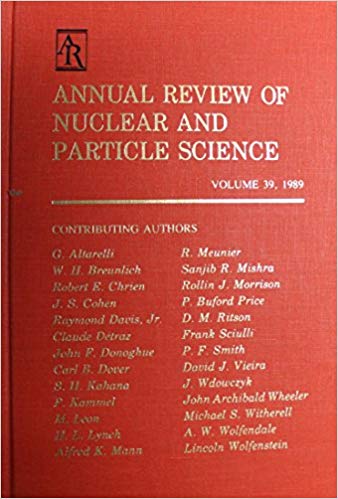重离子碰撞中的开放式重香料生产
IF 9.1
2区 物理与天体物理
Q1 PHYSICS, NUCLEAR
Annual Review of Nuclear and Particle Science
Pub Date : 2019-03-18
DOI:10.1146/annurev-nucl-101918-023806
引用次数: 58
摘要
在相对论重离子对撞机和大型强子对撞机上的超相对论重离子项目已经进入了高温下量子色动力学(QCD)定量分析的时代。强耦合夸克-胶子等离子体(sQGP)的显著发现,根据其在长波长的流体动力学行为推断,需要能够揭示其内部工作原理的探测器。粲强子光谱和底强子光谱为这些碰撞中产生的QCD介质的输运性质和微观结构提供了独特的见解。在低动量下,sQGP中重夸克的布朗运动可以获得它们的扩散常数,在中等动量下,这些夸克可以深入了解强子化机制,在高动量下,它们有望合并到辐射能量损失区。我们回顾了近年来在测量各种重味观测值,表征动量的不同制度和提取相关输运系数方面的实验和理论成果,以揭示sQGP的结构及其强子化。本文章由计算机程序翻译,如有差异,请以英文原文为准。
Open Heavy-Flavor Production in Heavy-Ion Collisions
The ultrarelativistic heavy-ion programs at the Relativistic Heavy Ion Collider and the Large Hadron Collider have entered an era of quantitative analysis of quantum chromodynamics (QCD) at high temperatures. The remarkable discovery of the strongly coupled quark–gluon plasma (sQGP), as deduced from its hydrodynamic behavior at long wavelengths, calls for probes that can reveal its inner workings. Charm- and bottom-hadron spectra offer unique insights into the transport properties and the microscopic structure of the QCD medium created in these collisions. At low momentum the Brownian motion of heavy quarks in the sQGP gives access to their diffusion constant, at intermediate momentum these quarks give insight into hadronization mechanisms, and at high momentum they are expected to merge into a radiative-energy loss regime. We review recent experimental and theoretical achievements on measuring a variety of heavy-flavor observables, characterizing the different regimes in momentum and extracting pertinent transport coefficients to unravel the structure of the sQGP and its hadronization.
求助全文
通过发布文献求助,成功后即可免费获取论文全文。
去求助
来源期刊
CiteScore
21.50
自引率
0.80%
发文量
18
期刊介绍:
The Annual Review of Nuclear and Particle Science is a publication that has been available since 1952. It focuses on various aspects of nuclear and particle science, including both theoretical and experimental developments. The journal covers topics such as nuclear structure, heavy ion interactions, oscillations observed in solar and atmospheric neutrinos, the physics of heavy quarks, the impact of particle and nuclear physics on astroparticle physics, and recent advancements in accelerator design and instrumentation.
One significant recent change in the journal is the conversion of its current volume from gated to open access. This conversion was made possible through Annual Reviews' Subscribe to Open program. As a result, all articles published in the current volume are now freely available to the public under a CC BY license. This change allows for greater accessibility and dissemination of research in the field of nuclear and particle science.

 求助内容:
求助内容: 应助结果提醒方式:
应助结果提醒方式:


